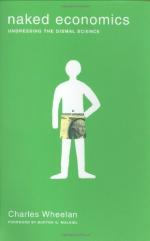
|
| Name: _________________________ | Period: ___________________ |
This test consists of 15 multiple choice questions and 5 short answer questions.
Multiple Choice Questions
1. The Lehman Brothers bank problem in 2008 occurred because the banks weren't what, according to the author?
(a) Using their own money.
(b) Paying out interest.
(c) Keeping enough money on hand.
(d) Analyzing risk.
2. OPEC has maintained its headquarters where since 1965?
(a) Havana.
(b) Vienna.
(c) Sydney.
(d) Toronto.
3. In what political structure does the government set the price and decide what's on the shelves?
(a) Capitalism.
(b) Marxism.
(c) Utopianism.
(d) Communism.
4. In what year did Douglas Ivester tell his sales team to pass free Coca-Cola around as the Berlin Wall toppled?
(a) 1982.
(b) 1977.
(c) 1969.
(d) 1989.
5. North Korea is a single-party state under a united front led by what party?
(a) The Democratic Party.
(b) The Korean Entitlement Party.
(c) The Communist Party.
(d) The Korean Workers' Party.
6. What is a fee paid by a borrower of assets to the owner as a form of compensation for the use of the assets?
(a) Deductible.
(b) Subsidy.
(c) Interest.
(d) Derivative.
7. According to the author in Chapter 7, the basic set of rules and investor should follow is to do what?
(a) Save, invest, and repeat.
(b) Invest, watch, sell.
(c) Research, fact check, invest.
(d) Research, invest, watch.
8. When did the Korean War begin?
(a) 1950.
(b) 1931.
(c) 1948.
(d) 1959.
9. According to the author, financial markets boil down to four basic simple needs. What is the first discussed in Chapter 7?
(a) Insuring against risk.
(b) Raising capital.
(c) Speculation.
(d) Storing, protecting and making profitable use of excess capital.
10. Burton G. Malkiel is an American economist, most famous for what classic finance book?
(a) The Millionaire Next Door: The Surprising Secrets of America's Wealthy.
(b) A Random Walk Down Wall Street.
(c) Extreme Money: Masters of the Universe and the Cult of Risk.
(d) The Wall Street MBA: Your Personal Crash Course in Corporate Finance.
11. In an insurance policy, what is the amount of expenses that must be paid out of pocket before an insurer will pay any expenses?
(a) Deductible.
(b) Inflation.
(c) Collateral.
(d) Subsidy.
12. What refers to the degree to which a correct forecast of a system's state can be made either qualitatively or quantitatively?
(a) Predictability.
(b) Security.
(c) Index.
(d) Recession.
13. What refers to a market where prices are determined by supply and demand?
(a) Random market.
(b) Controlled market.
(c) Free market.
(d) Influx market.
14. What term was first used in the early 1990s to denote an organization's reputation as an employer?
(a) The Juche Idea.
(b) Futures contract.
(c) Employer branding.
(d) Trade-off.
15. What is generally a fungible, negotiable financial instrument representing financial value?
(a) Portfolio.
(b) Index fund.
(c) Security.
(d) Option.
Short Answer Questions
1. According to the author, the Hope Scholarships were a plan wherein students could borrow money for college and pay back their loans after they graduated using what?
2. Michael Jensen refers to company stock options as what in Chapter 2?
3. The horns of the black rhinoceros are used to make what for the Yemenese people, according to the author in Chapter 2?
4. What does the author refer to as a situation where individuals work in their own best interest, leading to an improved standard of living for society in general?
5. Gary Becker is a professor of economics, sociology at what institution?
|
This section contains 524 words (approx. 2 pages at 300 words per page) |

|




